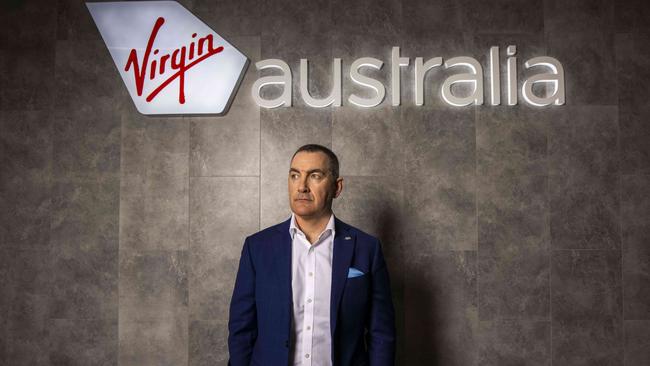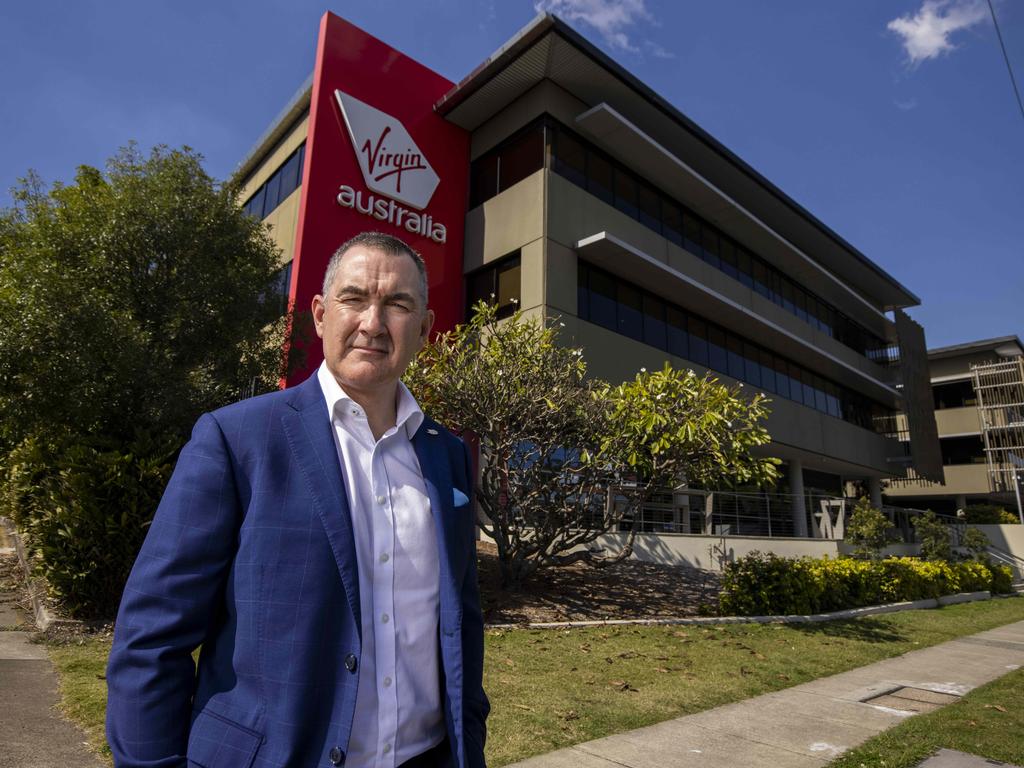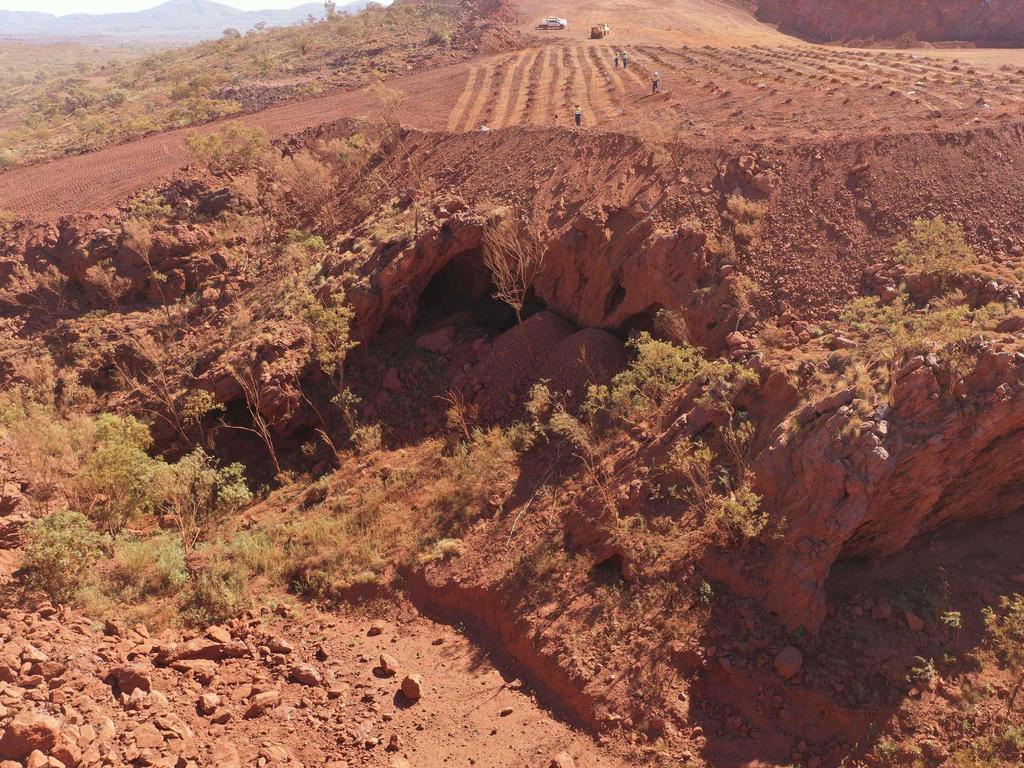Virgin Australia reborn smaller, but full service
Virgin reborn with strong balance sheet and a full service model serving both business and leisure travellers.

Virgin Australia is set to emerge from administration later this year as a “well capitalised” airline with a strong balance sheet and a full service model serving both business and leisure travellers.
In a briefing about the rebooted airline’s plans for emerging from administration when its sale to private equity play Bain Capital is finalised, Virgin chief executive Paul Scurrah outlined an airline that was more upmarket than the original Virgin Blue model first proposed by Bain.
However, he said the new airline would be smaller with fewer plans and the loss of 3000 jobs from its 9000 strong workforce.
Wednesday’s briefing headed off concerns that the new owners would seek to go ahead with a deeper cost-cutting regime, which would have seen the retrenchment of more than 4000 staff.
Mr Scurrah said Virgin had no intention of withdrawing from the business class market and leaving the premium service to its bigger rival Qantas. “We were not about to create a business airline monopoly,” he said.
Mr Scurrah said the airline would retain a “very human, more jovial culture than any other airline” in Australia but wold not return to the days of having staff “cracking jokes and rolling toilet paper down the aisle”.
“We will continue to harness our unique culture.”
He said Virgin management had been working with new owners Bain Capital to allow the airline to emerge from voluntary administration in a way that would make it “stronger, more profitable and more competitive in the future” following changes to reduce its cost base, including layoffs and negotiating tougher deals with suppliers to allow more flexibility in its operation.
Despite this, the airline is emerging back into the toughest market the aviation industry has seen in recent history.
On Wednesday, Queensland announced plans to close its borders to people in NSW and ACT while Victoria was set to begin one of the toughest lockdowns and controls on people movement since World War II.
At the same time, Richard Branson’s flagship Virgin Atlantic announced plans to file for bankruptcy in New York.
Mr Scurrah said expectations of a recovery in the domestic airline industry were much more cautious than before.
“The recovery is going to be slower than we first thought,” he said. “Domestic and short haul may take three years to fully recover with a very real chance it could be longer.”
“In this environment, all airlines will look very different. They will need to be simpler, have a strong long-term capital and a lower cost base.”
He said the airline had longer-term plans to fly to New Zealand and Fiji, as well resume its Japan and US flights when the markets opened up.
Still, Mr Scurrah said he applauded the move by Bain Capital to be prepared to “save an airline during a pandemic”.
“We have a great new partner,” he said, adding that Bain was “an experienced, well-resourced company” that was prepared to invest heavily in the airline. “They want this business to succeed,” he said.
The Boston-headquartered Bain, which took over an economic interest in the airline from the start of last month but will not assume legal ownership until after a meeting of creditors on September 4, planned to see the airline emerge from administration with little or no debt. When it collapsed in late April, Virgin had more than $6.8bn of debt on its balance sheet, including aircraft leases.
Low amount of debt
“Bain intends to have a low amount of debt, if any, on the balance sheet which gives us a very good starting point,” Mr Scurrah said. “It will be very well capitalised to begin with.”
He rejected suggestions that Bain would seek to improve the Virgin balance sheet by selling off a stake in its profitable Velocity frequent flyer business.
“People are starting to realise that data is increasingly valuable,” Mr Scurrah said.
He said the frequent flyer program was “very complementary” to the airline and was also in a position to contribute profits to the company.
Virgin had “other means to strengthen the balance sheet”, he added, including a renegotiation of its aircraft leases.
Mr Scurrah confirmed that former Jetstar chief executive Jayne Hrdlicka would be taking up a role as a director of Virgin but insisted she would not be taking over as chief executive.
“Bain has said it plans to have Jayne on the board but she has no interest in being the chief executive of an airline again,” he said.
While a binding contract has been signed between administrators and Bain, the finalisation of the deal still awaits approval of a deed of company arrangement to be put to creditors at the September 4 meeting.
Virgin administrator Vaughan Strawbridge rejected suggestions that the meeting would just “rubber stamp” his proposed deal. Rather, he said, it was clear that creditors would be better off voting in favour of his proposal than rejecting it.
Any vote that rejected Bain’s rebooted Virgin proposal would trigger liquidation for the airline and the sale of its assets.
While a group representing some $2bn in unsecured bondholders have said they want to present their own plan to the meeting, Mr Strawbridge said he would be backing the Bain deal.
Cost base ‘too high’
He admitted that Virgin’s cost base was too high and its business too complex even before COVID hit earlier this year. “It has taken some tough lessons but I am pleased we are on a more sustainable path with a great future for when the economy recovers.”
Under a contract signed at the end of June, Bain Capital currently has an economic interest in the operation of the airline, which has included an initial injection of funds of $125m.
The delay until next month for it to assume full legal ownership will give the administrators more time to finalise their plans for paying out creditors, including the $2bn in unsecured bond holders.
While a group representing the unsecured bond holders has said it wants to present its own proposal to the meeting, it now appears that this will not have any practical standing.
A spokesman for the administrators said on Wednesday they planned to approach the Federal Court for approval to extend the period to hold the second meeting of creditors to September 4.
The Transport Workers Union welcomed the proposed plan, which it said involved a “fuller capacity airline, maximising jobs, maintaining regional airline operation Vara, tiered cabin classes, airport lounges and the airline’s international arm.”
TWU secretary-general Michael Kaine said that while the job losses “would not be an easy process … Virgin workers have worked hard to ensure that instead of going down the route of a low-cost model where more jobs might have gone, it will be able to retain its place in the market and hold on to the vital experience and skills of many of its workers.
“The notion that Virgin could survive as a competitor to Jetstar and others at the lower end of the market was entirely baseless and something Virgin workers have opposed strenuously,” he said.
“We are pleased that this idea has been sidelined. This would only have played into the hands of Virgin’s competitors.”








To join the conversation, please log in. Don't have an account? Register
Join the conversation, you are commenting as Logout